One of the main questions people have about how to use essential oils is whether they can be ingested. In fact, you could say there’s an all-out fight about it in the essential oils community.
When you’re looking into this issue, a good place to start is researching how essential oils work. Knowing this will help you understand how they are best used. You can find a good beginning in your research with The Skeptic’s Guide to Essential Oils here on Intoxicated on Life. In that post, I share the science behind essential oils and how to use them.
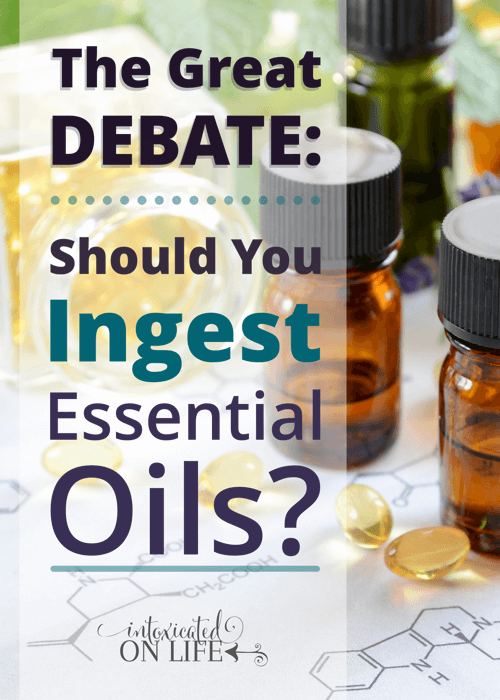
Many Different Opinions on Ingesting Essential Oils
Some folks say you should never ever ingest essential oils, citing the organizations that back up their assertion, while others say it’s fine if done wisely. Then there are those that swallow a capsule of it every day with breakfast and are still alive today. This makes things difficult for someone who just wants to find a straight answer and get on with the reasonable use of essential oils.
Unfortunately, I’m not going to be making your life any easier today with a straight answer. However, I will share what I’ve learned along the way and what we have decided to do in our home.
Learn more about my favorite essential oils in this post.
Opinion #1: Never Ingest Essential Oils
First up are the “never-ever” folks. There are many companies, organizations, and individuals who will tell you to never ingest essential oils because it is dangerous. They will even say that those who ingest oils, or those who tell others that it is ok, are being irresponsible at best.
There are generally four reasons you will be told to never ingest oils:
- They heard it somewhere (a blog post, the company they buy from, an organization) and just assume it’s correct.
- They don’t really know but just want to avoid potential liability.
- They are afraid people will ingest without doing proper research and hurt themselves or someone else.
- They are concerned about additives in adulterated oil and, in the case of a seller, they may not be willing to admit it.
It is absolutely true that essential oils should be handled with care. These are not flavorings, teas, herbs, or spices that you can experiment with on a whim and without any concern for safety. Essential oils are highly concentrated chemical constituents that will have an effect on your body that can be very dramatic, and even dangerous, when used inappropriately.
Potential harm comes not just from possible impurities in the oil—even the most pure oils can be harmful if used in excess or incorrectly. Why? Because the naturally occurring toxic, irritating, or sensitizing properties of a plant are highly concentrated in the essential oil. This can negatively effect the internal organs and surfaces of the digestive system. Depending on how much is ingested, the body can also react to the excessive levels of the chemical constituents of the essential oils in extreme ways such as headaches, seizures, and even death. Add to that the possibility of contraindications with regular medicines a person may be taking, and you can see why caution and due diligence in researching an oil before you take it is important.
Because of this potential danger, many individuals and organizations err on the side of caution and say never to ingest. For example, the National Asssociation for Holistic Aromatherapy (NAHA) says “Do not take essential oils internally without appropriate clinical education and understanding of the safety issues involved in doing so.” You will find similar statements from other organizations such as the Alliance for International Aromatherapists.
A big part of making your decision on whether to ingest oils is to consider the source of your information. There are different organizations and certified individuals that are deemed authoritative—but even they may not really be giving you a balanced answer. How many blog posts have “consult a certified aromatherapist” somewhere just to cover their rears?
You need to consider your source. Are you getting your information from a company selling oils, an organization like the NAHA, a certified aromatherapist, or someone educated with the latest online class? There are things you need to consider when weighing their input.
Opinion #2: Ingest Essential Oils for Every Problem
On the other side of the spectrum are those that ingest oils all the time and for every ailment. They will tell you how in France people ingest oils frequently at the recommendation of aromatherapists (who may also be medical doctors), and the U.S. is just too scared of it. Of course, I have also read that it is illegal for aromatherapists in Australia to recommend ingestion.
You will find that the most liberal recommendations on essential oil ingestion come from multi-level marketing companies selling the oils they are suggesting you ingest, and from blogs and articles written by people who use and/or sell oils. You will find recipes and “protocols” as well as the suggestion that this is the most direct and beneficial way to get the oils to where they need to go in your system. Not all people who sell oils recommend excessive internal use of essential oils, but all cases I have found come from those sources.
There are also companies that are more inclined to suggest ingesting oils than is probably called for. It is possible they want you to consume, and therefore buy, more oils and so they recommend the quickest way of using them up. On they other hand, they may simply be suggesting one of several ways of treating a problem.
Opinion #3: Ingest When Appropriate and Use Common Sense
Whether it’s relating to ingestion or other types of application, it is important that we don’t just wing it when it comes to essential oils. Be smart! Experience and a trusted source of information are likely your best bet in determining when to ingest oils.
Essential oils are useful and powerful, so use appropriate caution. And keep in mind that children should not ingest oils. Not only are they more at risk because their bodies and immune systems aren’t fully developed, but you do not have the same benefit of evaluating the effect of an oil as you would when taking it yourself.
At the moment, one of my favorite sources of safety information is Robert Tisserand. For example, he wrote a book called Essential Oil Safety: A Guide for Health Care Professionals. In the book he mentions that when oils are ingested, about 95% is absorbed into the blood stream as opposed to up to 10% when applied topically (slightly more if the oil is not diluted). Greater absorption of oil means that there is a greater risk of harm if used in excess. I have also been enjoying Tisserand’s blog. Here is his take on the issue:
I do not believe that non-practitioners should prescribe/recommend oral use of EOs or others, and I am wary of scenarios involving the liberal oral use of EOs for people who are not sick. But I am not, and have never been, against sensible self-treatment using EOs orally, for a limited period of time.
If you are considering ingesting essential oils, do these three things:
- Read up on the oil and any warnings or contraindications
- Start with a very small amount of oil and work up from there
- Treat essential oils as if they are powerful medicines, because that’s what they are.
Bottom line: ingesting essential oils isn’t dangerous, but stupidity is. There is no reason to not inform yourself and use caution.
My Take: Ingesting Essential Oils Isn’t Worth It
This is where I fall on the issue. Really, there are very few reasons to ingest essential oils. Due to the way essential oils work on the body, the most reasonable and/effective ways to use them are probably topical application and inhalation. In most cases, ingesting oils is wasting them. Some believe ingesting oils changes them or that they won’t be absorbed and delivered effectively, even if it’s the stomach you are targeting. Some suggest that the absorption rate of ingestion is extremely high, perhaps even too high, and may pose a danger.
With topical and inhalation use proving so effective, why bother wasting oils or risking harm? What we’re doing with roll-ons, diffusers, etc. is working wonderfully! Of course, it would be great if more research on the effect of ingesting oils could provide more information, but considering the lack of general essential oils research out there, I’m not holding my breath.
Now, I’m not knocking the internal use of oils. There are far more experienced essential oils users than I out there who know what works for them. There are some situations where ingesting may be a good call. Before you make that move, I just ask that you’d take a good look at your information source and then do the three points I listed above: Read up, start small, and properly handle the potency of oils.
So, what’s your take on ingesting oils?
Interested in essential oils? Let’s talk! Click here to learn more about essential oils and how to find good-quality oils for your family.
Free Download: Mom’s Essential Oil Cheat Sheet
Would you like a resource to help you learn to use essential oils with your family? Download this free 3-page printable:
- Basic guidelines for using essential oils around kids
- A list of safe, kid-friendly oils essential oils
- Helpful essential oil recipes
Click the link or image below to download the 3-page Mom’s Essential Oil Cheat Sheet. I’ll follow it up with more resources and free printables to help you on your essential oil journey. Grab your copy now!

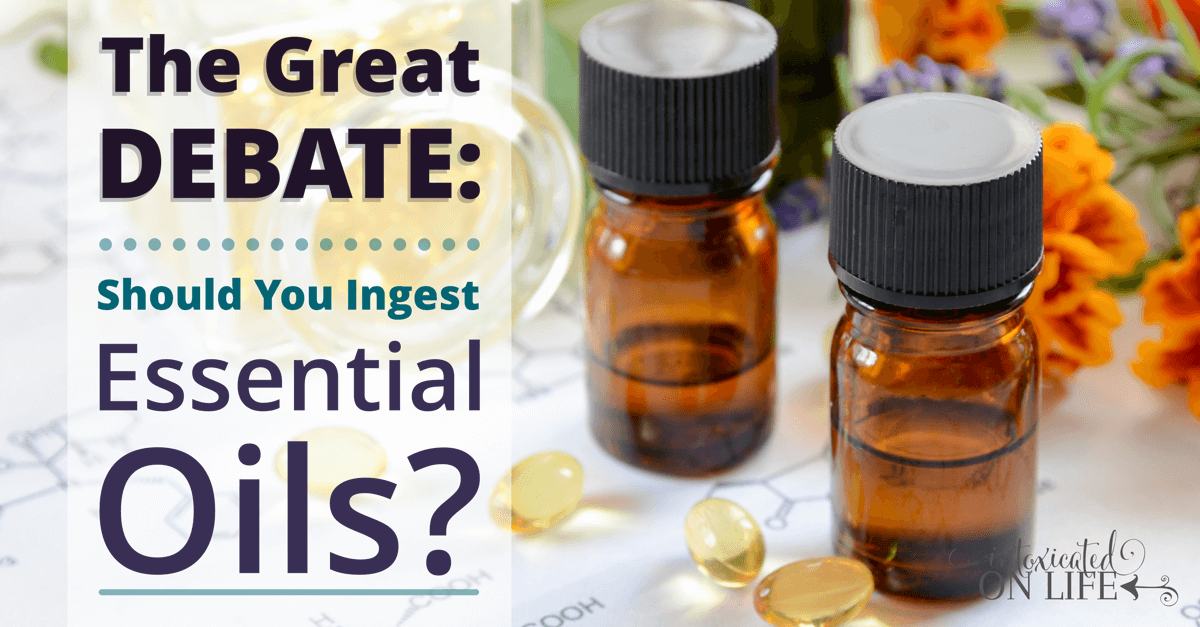
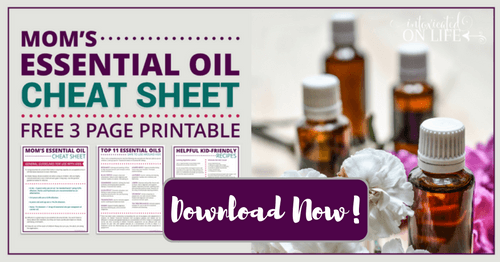
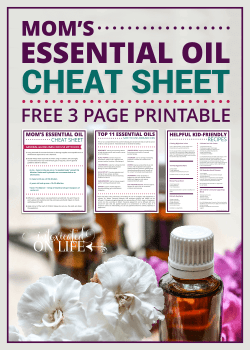
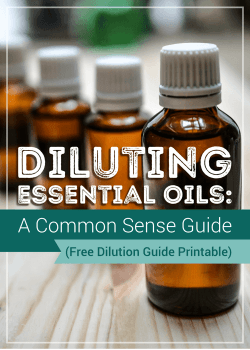
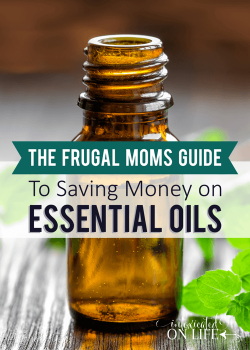
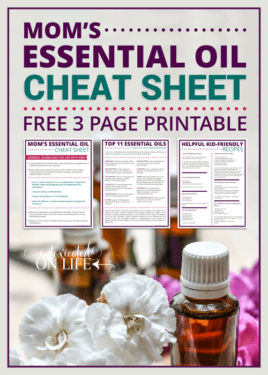



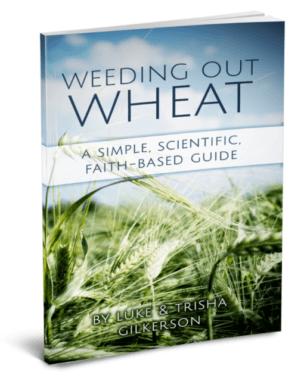

This is an excellent article and fabulous resource for anyone who is interested in learning more about essential oils. I have bookmarked it and can’t wait to come back and surf through all of your links, you definitely shared a wealth of information. Thank you!
Great! I’m so glad you found the information helpful. 🙂
Tauna,
I just came across you blog this evening and truly appreciate your honest and unbiased approach to your journey and sharing information you have learned about essential oils. I was introduced to essential oils last November (one of the popular MLM companies) and have really enjoyed their products but I have been trying to do as much research as I can from many different sources so I can share the benefits of essential oils with my friends and family responsibly. I have only read a couple posts so far, but am looking forward to more! 🙂 Thank you!! 🙂
Thank you for the comment Becky – I am so glad you have found the information helpful! 🙂
Thank you for organizing all of these thoughts into a good article. We do use them internally on a very limited basis… not often, but sometimes oregano oil in a capsule really helps a bad infection… other times a drop of lemon, grapefruit or peppermint oil, etc in water can be helpful. Still, probably about 98% of our oil use is in the form of rollers, diffusers, spray, topical application, etc.
You’re welcome! 🙂
One of the best articles I’ve ever read on using safely E.O.s. Thanks!
Thanks KJ!
I wrote a similar post a few weeks ago, and I think it’s so important to get balanced information out there. I don’t ingest essential oils daily, or even often. But if I’m having a gallbladder attack? Yes, I will. Thanks for being a voice of reason in a regularly hot-headed discussion.
You’re so right. It’s hard not just to get lost in the articles that go extreme in one way or the other! Thanks for stopping by.
This is a great resource! I, like you, choose to not ingest essential oils because I don’t think the benefits outweigh the risks for me. While I have some training in essential oil use, I don’t feel like it’s sufficient for me to really understand the potential dangers of ingesting (outside of adding a drop of orange or lemon to something I’m cooking). I feel that herbal tinctures are a much wiser choice for me if I want to get a concentrated amount of herbal compounds in me, and I like that tinctures contain more than just the volatile compounds of the plant. Down the road, if I get advance training in aromatic medicine, I would then consider the internal use of oils.
It’s really interesting that you mention tinctures. That’s something I’ve been meaning to look into and experiment with. I’ll have to check them out next. Thank you!
I would also ad that it is incredibly important to be sure that any oil you do choose to ingest is fully organic. This is due to the fact that any toxins will also be highly concentrated. Other factors to consider are possible contaminants from companies that might have adulterated oils. A really helpful bit of information to get from any company so that you know what is in the actual batch of oils you are considering using is something called the GC/MS test reports. A good company will freely give you access to these and these will show you how potent the oil is as well as any potential toxins. Something else to consider is that each plant is unique. The soil it was grown in, the weather and a myriad of other factors will increase the plants potency or reduce it. That is why these tests are helpful in determining the dose and also why certification can be helpful… you know the dose a little better and how to apply it.
There are many other certification institutes that have higher standards and better quality education coming out of Europe than the U.S. One that I highly recommend is the Franklin Institute of Wellness…. They are the only fully authorized college in America. They are hands down the best and have been trained in Europe. They are not some fly by night certification company. And they are working on being a fully accredited college which should take place by the end of the summer. You don’t find that in the natural health world very often. These people have impeccable standards. http://franklininstituteofwellness.com/
Good point Amanada!
Thanks for the information! I’ll check that resource out. It’s also worth noting that a company may use great wild harvested or organically grown oils that they know use no chemicals or fertilizers, and still not have the organic label on their bottles. So important to research your company and know them well!
Great article Tauna!!
What EO’s do you recommend for ingestion??… I have fibromyalgia and I would love to try anything that is safe and reliable to help me with the pain…
Thanks!!!
The general consensus is that oils that are unadulterated and pure are safer for ingestion, although you still have to be extremely careful. So, Native American Nutritionals and companies such as Young Living and DT claim they are safe for ingestion, although the latter two seem to promote it more often. That’s my impression!
Fellow fibromyalgia sufferer here. I’m new to EO usage, but I’ve found that external usage on the areas is usually sufficient. The only internal use, that I do, is lemon oil for reflux. One drop lasts three to five days. Unfortunately, there is no cure or solid treatment for fibromyalgia. Modern medicine hasn’t licked it either. I’m in the midst of taking all drugs out of my life and replacing with aroma therapy and topical usage. Lemongrass, frankincense, and helichrysum and perhaps using eucalyptus globulous, in a carrier oil and applied to the areas has yielded some relief for me.
I am so confused .
In one paragraph the article says that 95% of ingested oils are absorbed, while only 10% of topical oils are absorbed.
Then at the end with the final take, the article says that topical is better and more effective since ingested oils are “not absorbed and delivered effectively.”
Could someone clear this up?
Yes Amber! Thank you for pointing that out. I changed it to clarify what I meant to originally.
“This is where I fall on the issue. Really, there are very few reasons to ingest essential oils. Due to the way essential oils work on the body, the most reasonable and/effective ways to use them are probably topical application and inhalation. In most cases, ingesting oils is wasting them. Some believe ingesting oils changes them or that they won’t be absorbed and delivered effectively, even if it’s the stomach you are targeting. Some suggest that the absorption rate of ingestion is extremely high, perhaps even too high, and may pose a danger.
With topical and inhalation use proving so effective, why bother wasting oils or risking harm? What we’re doing with roll-ons, diffusers, etc. is working wonderfully! Of course, it would be great if more research on the effect of ingesting oils could provide more information, but considering the lack of general essential oils research out there, I’m not holding my breath.”
I have just come across your article while researching the debatable question. I am a self taught enthusiast and have yet to cross the “ingest EO’s” threshold. I feel if i have this hesitation and keep over thinking it, I’m not ready. Like you said, until more research comes out… I’ll wait!!! AND even more… If I ever do decide to ingest, it will ONLY be a certified ORGANIC oil 🙂 I love Mountain Rose Herbs. Thanks for the great read!!
Cassie
I recently changed oil companies after listening to a seminar the other day. Many companies promote the use of oils internally and I had been using them internally for years. I listened to a speaker from the company http://www.betteressentials.com who reminded everyone in the seminar to take essential oils very seriously. She reminded us that these oils are very powerful and you should talk with a aromatherapist or professional before using oils. I love the discussion that is going on about the use of oils and how they need to be used very responsibly.
I completely agree with your take on this. I have always preached against ingesting essential oils and honestly I think it’s a gimmick (mostly by the tiered essential oil marketing companies) to get customers to use them w/food and recipes. Using essential oils for drinks, snacks and foods will attrack a large client-base. I don’t believe essential oils should be used that way. I’ve ingesting oils before just to try it and it had significant adverse affects on me. Topical and inhalation is the way to go, and there is a LOT more science in that arena.
Hi, Julie, would you mind sharing how you took the oils internally, how many drops, and which ones? Was this diluted or not diluted? Thanks!
Hi Amber, I actually consistently advice against ingesting oils (see my comment above). I tried doing it once (before I was educated on essential oils), and I added a couple drops of tea tree oil to my hot water tea. It was awful and made me sick. I don’t believe there is enough science to back up the benefits to ingesting essential oils. They are so concentrated and powerful. I think some of the essential oil companies favor ingesting oils as a marketing scheme. Ingesting oils makes people use them up faster (and perhaps they will buy more faster), and it brings a whole new marketing category into play for them….cooking! I don’t like that take. Hope this helps answer your question…. Let me know if there’s anything else I can help you with (matsdown@gmail.com).